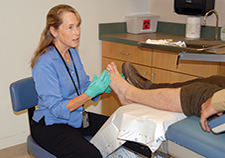Office of Research & Development |
 |

 Photo: ©iStock/AndreyPopov
Photo: ©iStock/AndreyPopov
June 27, 2019
By Mike Richman
VA Research Communications
"One interpretation of this is that good glycemic control is beneficial. But it must be sustained, or the benefit is lost."
VA researchers have published long-term follow-up results from a major diabetes trial, in which patients saw no significant drop, on average, in heart attacks or strokes—despite intensive therapy to lower blood sugar levels.
The results appeared in the New England Journal of Medicine in June 2019, a year after they were presented at a symposium of the American Diabetes Association.

VA enrolling participants for groundbreaking diabetes study

Diabetes wound care: Much progress in past 25 years, but challenges remain

In Iowa VA lab study, fish oil eases diabetic neuropathy
In 15-year findings from the VA Diabetes Trial (VADT), researchers found that nearly six years of aggressive lowering of blood sugar levels resulted in a non-significant 12 percent decline in cardiovascular events—a composite of heart attack, stroke, cardiovascular death, congestive heart failure, and amputation from gangrene—when compared with standard therapy. The cohorts also showed no differences in all-cause death, and a long-term trend for reduced renal (kidney) events was insignificant.
In the earlier 10-year follow-up, the results of which were published in the New England Journal of Medicine in 2015, patients in the aggressive blood sugar-lowering group had a significant 17 percent drop in cardiovascular events. But that decline didn’t extend to 15 years after blood sugar levels merged between the two groups. That suggested there was no carry-over benefit or “legacy effect” from the earlier period.
Blood sugar, or glucose, levels rise higher than normal in people with diabetes. Reducing blood sugar to normal levels is also known as tight or intensive glycemic control. In less aggressive therapy, the goal may be to slightly lower levels but not to get them quite to normal.
“This points out how difficult it sometimes is to maintain tight glycemic control,” Dr. Nicholas Emanuele, one of the three lead investigators on the VADT follow-up, told VA Research Currents after the results were presented. “Outside the rigors of a precise protocol like the VADT, it’s easy for patients to let glucose control slip. It’s a tough disease in many ways.
Emanuele is a specialist in endocrinology, diabetes, and metabolism at the Edward Hines, Jr. VA Hospital in Illinois.
“Remember, there was a significant cardiovascular benefit of good sugar control at 10 years,” he says. “So, one interpretation of this is that good glycemic control is beneficial. But it must be sustained, or the benefit is lost.”
The VA Diabetes Trial, which began in 2000, was a randomized trial of intensive glycemic control in Veterans with advanced type 2 diabetes. It was sponsored by the VA Cooperative Studies Program. The 1,791 participants from 20 VA medical centers were at relatively high risk for cardiovascular disease, including heart attack and stroke. Many of the Vets already had cardiovascular disease when they enrolled in the study. The two cohorts were identical in gender (predominantly male), average age (61), and average number of years with diabetes (12).
The researchers will be writing on the VADT and VADT follow-up in the coming years beyond what was published in the New England Journal of Medicine. But no follow-up past the 15-year mark is planned at this point.
VA Research Currents archives || Sign up for VA Research updates